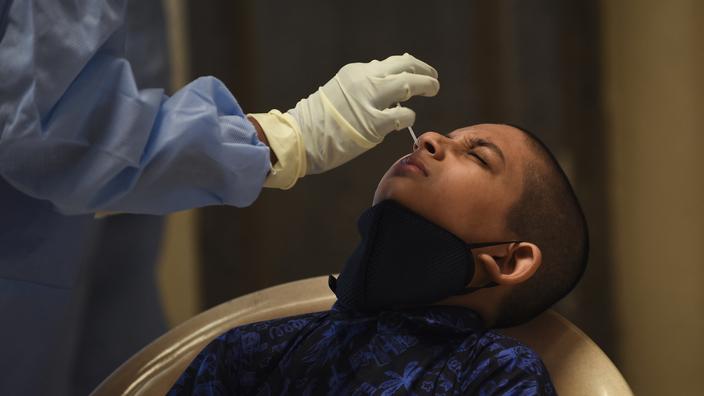Primary and kindergarten children return to school on Monday after three weeks of vacation.
With this in mind, the Scientific Council recommends, in its opinion of April 19, to generalize the use of self-tests in schools.
These, easier to use than saliva tests, can "
become a real opportunity for screening and risk reduction
", according to scientists.
If the National Education is not yet able to specify how many tests will be made available from April 26, 52 million self-tests have been ordered according to Europe 1.
Read also: Will the reopening of schools fuel the epidemic?
Read also: Covid-19: instructions for use of self-tests
In accordance with the recommendation of the Haute Autorité de Santé to reserve them for over 15s, they should be distributed first to teachers and high school students, at the rate of twice a week. Will this 30-minute ritual take place at home or at school? On site "
with a first learning period
", answers the Scientific Council, then a realization "
at home under the control of the parents
". For Frédérique Rolet, general secretary of SNES-FSU, the first union of high school teachers, this is a solution that will only work "
if they are carried out seriously
" and "
if the management is immediately informed of each positive case.
".
This transparency is necessary for the system, already developed in the United Kingdom, Germany and Austria to be effective.
SEE ALSO -
Covid-19: how to properly use your self-test?
A pharmacist answers us
Read also: Health protocol, tests, bugs: five questions on the reopening of schools
Two tests per week for British high school students
After being closed for almost two months, British schools once again welcomed their pupils between the beginning and the end of March, depending on the level. But with a strict health protocol to respect. In addition to wearing a compulsory mask, all high school students are invited to carry out a self-test at home, twice a week. In the event of a positive result, the young person is invited to isolate themselves before carrying out a PCR test to certify the diagnosis. Other establishments have chosen to install a rapid test center in gymnasiums in order to teach students the gesture and then make them independent. While not compulsory, it is strongly encouraged and well attended in UK schools.
In the first week of classes, the UK government distributed 57 million rapid tests to secondary schools. Reassuring for some parents and teachers, painful for others who report a few hiccups like classes closed because of a positive self-test then denied by a negative PCR. For its part, the government welcomed "
the incredible success of the return to school and university
" based on "
higher school attendance than at any time during the fall session.
".
Faced with their reliability, 82% of the results are confirmed by a PCR test, the device could be extended to nurseries, schools and colleges.
The British authorities even hope to allow children to remove their masks next May if the health situation allows it, knowing that the United Kingdom has already administered a first dose to 33 million Britons.
Read also: England enjoys the reopening of its pubs
In the process of being extended to nurseries in Austria
While France had not yet started its third confinement, Austria was coming out with strict measures to be respected, especially in schools. Since February 7, the little Austrians in primary school have been invited to carry out, within the establishment itself, unlike their British neighbors, two tests per week. Against once for their elders. Not mandatory, self-test campaigns are very well accepted by parents who give their consent to 98% while demonstrations against health measures are often organized in the country.
Each week, the government sends 1.4 million tests to schools, of which 1.1 million are devoted to students, the rest to supervisory staff. In the slightest positive case, the child is asked to go home and carry out a confirmation PCR. A discipline well respected by the Austrians. Only 14 classes were closed at the end of March. Satisfied, the government is not stopping there. In the region of Vienna (Lower Austria), a pilot study is being carried out among children in nurseries and kindergartens, for whom nasal swabs are particularly painful. The supervising adults pass a "
pacifier
" in their mouth to find out whether or not they are carriers of Covid-19.
An ambitious tracing policy, associated with a curfew from 8 p.m. to 6 a.m., a closure of restaurants and the compulsory wearing of the FFP2 mask in transport and stores, which allows the country to achieve its deconfinement with only 2,000 new cases and 38 deaths daily.
Read also: The distance is less of a concern than the real date of the start of the school year
Figures envied by France which records a daily rate of 40,000 contaminations and more than 300 deaths. On the eve of a new school year which promises to be tense in terms of health, the introduction of self-tests is well received by the unions even if they regret their late arrival. "
It's obviously a good idea, but we've been asking for it since February
," deplores Rodrigo Arenas, co-president of the FCPE, the majority union of parents. Asked by
Le Figaro
, he is "
obviously in favor
" of the deployment of self-tests in France but "
it is not enough
". "
We treat the consequence and not the cause
", Adds Laurent Hauffmann, president of the national school union (SNE).
Together, they call for a stricter protocol and extensive vaccination for all teachers.
For its part, the Scientific Council notes "
the increasing effectiveness in reducing the size of the epidemic
" with regular screening, which could also be deployed during family and festive reunions in the summer.







